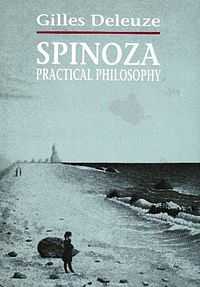Spinoza: Practical Philosophy
| Spinoza: Practical Philosophy | |
|---|---|
 The 1988 City Lights edition | |
| Author | Gilles Deleuze |
| Original title | Spinoza: Philosophie pratique |
| Translator | Robert Hurley |
| Country | France |
| Language | French |
| Subject | Philosophy |
| Publisher | Presses Universitaires de France |
Publication date | 1970 |
Published in English | 1988 |
| Media type | Print (Hardback & Paperback) |
| Pages | 130 (English edition) |
| ISBN | ISBN 0-87286-218-6 (English edition) |
Spinoza: Practical Philosophy (French: Spinoza: Philosophie pratique) is a 1970 book by Gilles Deleuze that examines Spinoza's philosophy of The Ethics. Deleuze's last work published before his collaboration with Félix Guattari on Anti-Oedipus, it presents the formal Spinozist environment in which his later ideas are situated, to such an extent that it includes a lengthy index of main concept definitions. Deleuze attempts to relate Spinoza's ethical philosophy to the writings of Friedrich Nietzsche and Blyenbergh, a grain broker who corresponded with Spinoza in the first half of 1665 and questioned the ethics of his concept of evil.
Key concepts
Spinoza's evolution: Nietzsche
The kinship of Spinoza and 19th-century philosopher Nietzsche is made quite clear in this book, but there is also a historical line of connection between the two that Deleuze discusses elsewhere: "this line passes through a form that we often call Man. Spinoza is prior to that form, and Nietzsche sees beyond it. What they share, on this line, is a philosophy of forces that compose such forms and shape the passions of Man." Throughout the text Deleuze makes constant reference to Nietzsche's poetry suggesting a similarity of subject matter and historical timeframe. The subject is the rational mechanics of Spinoza's Ethics which is very closely situated to the political psychology of his contemporaries such as Thomas Hobbes and John Locke.
Decomposition and composition
Deleuze uses Spinoza's example from the Hebrew Bible when Adam is with God in the Garden of Eden to question the nature of the Forbidden Apple. In Spinoza's analysis the "Apple's nature is to decompose the nature of Adam, much like a poison."2 When a body encounters another body, or an idea another idea, it happens that the two form a more powerful whole, and sometimes one decomposes the other, destroying the cohesion of its parts. In this way we come to relate to foreign bodies differently in the anticipation of their affects on our body. "These determinative affections are necessarily the cause of the consciousness of the conatus.".3 Consciousness experiences joy or sadness depending on whether the body encountered enters into composition with us, or tends to decompose us. Consciousness is transitive, it is the continual awareness of the passage from these totalities. It is not a property of the whole; it has only an informational value, and the information is necessarily confused and distorted by affections.
Ethics vs. morality and the rule of three
Once again Deleuze uses Spinoza's example from the Bible. When Adam hears God's word, he understands these words as the expression of a prohibition. They refer to a fruit that will poison Adam if he eats it. It is a concept of a complex Evil that "will determine the parts of Adam's body to enter into new relations that no longer accord with his own essence". But because Adam is ignorant of causes, he thinks that God morally forbids him something, whereas God only reveals the natural consequence of ingesting the fruit. In this way, Ethics replaces Morality, which always refers existence to transcendental values .i.e. God's judgment . With Spinoza's Ethics, the opposition of values (Good-Evil) is supplanted by the qualitative difference of modes of existence (good-bad). However, this re-formulation of psychological consciousness is illusory and it amounts to a very similar compromised situation. This is because if consciousness is content to wait for and take in effects, consciousness misapprehends all of Nature. Deleuze points out here that "all one needs in order to moralize is to fail to understand [...] If we do not understand the rule of three, we will apply it, we will adhere to it, as a duty." Law, whether moral or ethical, does not provide us with any knowledge; it makes nothing known. At worst it prevents the formation of knowledge. At best, it prepares for knowledge and makes it possible. Deleuze sees an elaborate evolution of ontology, which he calls a long error whereby the command of God is historically mistaken for something to be understood, obedience for knowledge itself and Being for Fiat.
Translation
In 1988, the book was translated into English by Robert Hurley and published by City Lights Books.
Endnotes
- ^ (Introduction of the English edition)
- ^ (Chap.1)
- ^ (Ethics, III. definition of desire)
- ^ (Chap.1)
See also
| |||||||||||||||||||||||